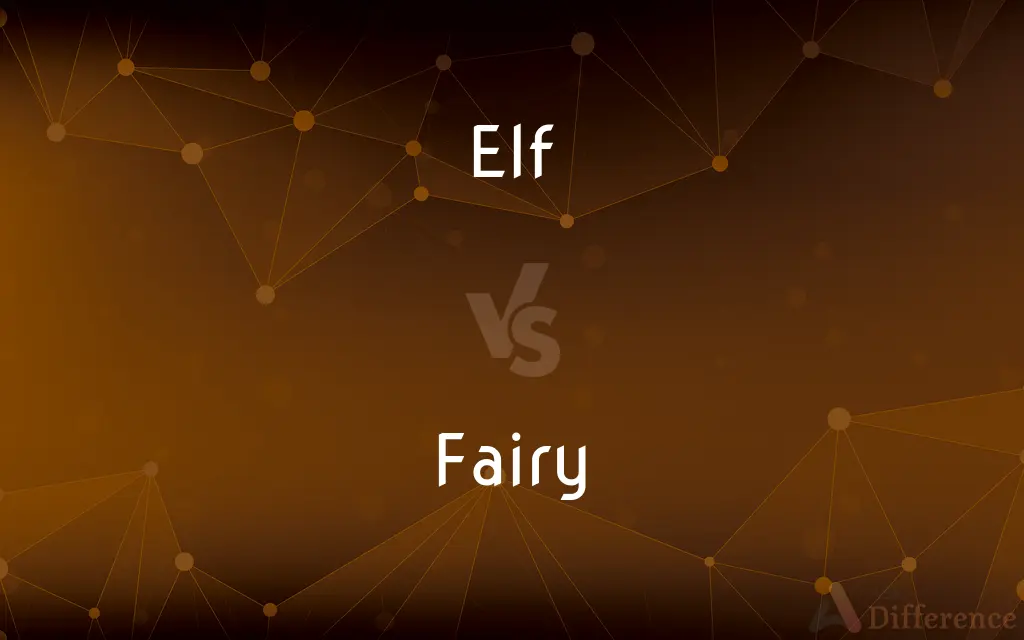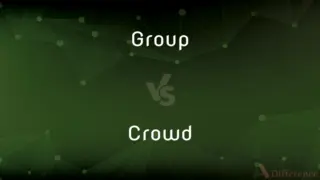Elf vs. Fairy — What's the Difference?
By Tayyaba Rehman — Updated on October 22, 2023
Elves are mythical beings often linked to nature and ancient magic, while fairies are magical creatures often seen with wings and linked to natural elements.

Difference Between Elf and Fairy
Table of Contents
ADVERTISEMENT
Key Differences
Elves and fairies both hold an esteemed place in folklore and literature. Elf, originating from Norse mythology, is usually depicted as a tall, pointy-eared, human-like creature possessing ancient wisdom and magic. Fairy, on the other hand, often drawn from Celtic and other European traditions, is frequently portrayed as a tiny, winged being with a strong connection to nature.
In literature, elves have been depicted as noble warriors or wise magicians, as seen in J.R.R. Tolkien's works. Fairies, conversely, often have playful or mischievous characteristics, as seen in tales like Shakespeare's "A Midsummer Night's Dream."
When delving into their habitats, elves are often associated with forests, hills, or other earthly realms. Fairies, while also linked to nature, are more commonly related to specific elements like water, air, or flowers.
Regarding their powers, elves are often endowed with superior strength, intelligence, or even immortality. Fairies, although powerful in their own right, wield more elemental and nature-based magic, granting them abilities like flight or invisibility.
Interestingly, despite their distinct characteristics, elves and fairies often overlap in popular culture, leading to interchangeable use in stories. However, traditional lore maintains clear distinctions between the two.
ADVERTISEMENT
Comparison Chart
Origin
Norse mythology
Celtic and other European traditions
Physical Appearance
Tall, human-like, pointy ears
Tiny, often winged
Literary Representation
Noble warriors or wise magicians
Playful or mischievous beings
Habitats
Forests, hills, earthly realms
Tied to natural elements like water, air, or flowers
Powers
Superior strength, intelligence, immortality
Elemental and nature-based magic, flight, invisibility
Compare with Definitions
Elf
A representation of wisdom and ancient magic.
The elf shared tales from eons past, captivating the audience.
Fairy
A being with a strong tie to nature's elements.
The fairy could summon rain with a simple dance.
Elf
A creature with pointy ears and magical abilities.
The elf cast a spell, turning the night into day.
Fairy
A playful or mischievous entity from folklore.
The fairy played pranks, hiding objects in unexpected places.
Elf
A character often linked to nature and earth.
The elf felt a deep connection to every tree and stone.
Fairy
A creature often seen in European traditions.
The fairy tales from old Europe spoke of these magical beings' deeds.
Elf
A mythical being from Norse mythology.
The elf stood tall, overseeing the ancient forest.
Fairy
A tiny magical creature with wings.
The fairy fluttered around the garden, spreading joy.
Elf
An elf (plural: elves) is a type of humanoid supernatural being in Germanic mythology and folklore (especially North Germanic mythology and folklore). In medieval Germanic-speaking cultures, elves generally seem to have been thought of as beings with magical powers and supernatural beauty, ambivalent towards everyday people and capable of either helping or hindering them.
Fairy
A fairy (also fay, fae, fey, fair folk, or faerie) is a type of mythical being or legendary creature found in the folklore of multiple European cultures (including Celtic, Slavic, German, English, and French folklore), a form of spirit, often described as metaphysical, supernatural, or preternatural. Myths and stories about fairies do not have a single origin, but are rather a collection of folk beliefs from disparate sources.
Elf
A mythical creature in human form but usually smaller, often considered mischievous.
Fairy
A small imaginary being of human form that has magical powers, especially a female one
Fairy gold
She believed she had had fairies at the bottom of her garden
Elf
A lively, mischievous child.
Fairy
A Central and South American hummingbird with a green back and long tail.
Elf
A usually sprightly or mischievous or sometimes spiteful person.
Fairy
An imaginary being in human form, depicted as clever, mischievous, and possessing magical powers.
Elf
(Norse mythology) A luminous spirit presiding over nature and fertility and dwelling in the world of Álfheim (Elfland). Compare angel, nymph, fairy.
Fairy
Offensive Slang Used as a disparaging term for a gay man.
Elf
Any from a race of mythical, supernatural beings resembling but seen as distinct from human beings. They are usually delicate-featured and skilled in magic or spellcrafting; sometimes depicted as clashing with dwarves, especially in modern fantasy literature.
Fairy
The realm of faerie; enchantment, illusion.
Elf
(fantasy) Any of the magical, typically forest-guarding races bearing some similarities to the Norse álfar (through Tolkien's Eldar).
Fairy
A mythical being with magical powers, known in many sizes and descriptions, although often depicted in modern illustrations only as a small sprite with gauze-like wings, and revered in some modern forms of paganism.
Elf
A very diminutive person; a dwarf.
Fairy
An enchantress, or creature of overpowering charm.
Elf
(South Africa) The bluefish (Pomatomus saltatrix).
Fairy
A member of two species of hummingbird in the genus Heliothryx.
Elf
To twist into elflocks (of hair); to mat.
Fairy
A legendary Chinese immortal.
Elf
An imaginary supernatural being, commonly a little sprite, much like a fairy; a mythological diminutive spirit, supposed to haunt hills and wild places, and generally represented as delighting in mischievous tricks.
Every elf, and fairy sprite,Hop as light as bird from brier.
Fairy
Like a fairy; fanciful, whimsical, delicate.
Elf
A very diminutive person; a dwarf.
Fairy
Enchantment; illusion.
The God of her has made an end,And fro this worlde's fairyHath taken her into company.
Elf
To entangle mischievously, as an elf might do.
Elf all my hair in knots.
Fairy
The country of the fays; land of illusions.
He [Arthur] is a king y-crowned in Fairy.
Elf
(folklore) fairies that are somewhat mischievous
Fairy
An imaginary supernatural being or spirit, supposed to assume a human form (usually diminutive), either male or female, and to meddle for good or evil in the affairs of mankind; a fay. See Elf, and Demon.
The fourth kind of spirit [is] called the Fairy.
And now about the caldron sing,Like elves and fairies in a ring.
Elf
Below 3 kilohertz
Fairy
An enchantress.
No goblin or swart fairy of the mineHath hurtful power over true virginity.
Elf
A skilled warrior or artisan in many fantasy tales.
The elf's craftsmanship was unparalleled, producing the finest weapons.
Fairy
Of or pertaining to fairies.
Fairy
Given by fairies; as, fairy money.
Fairy
Small, human in form, playful, having magical powers
Fairy
A representative of elemental and nature-based magic.
With a wave, the fairy turned the barren land into a blooming meadow.
Common Curiosities
What's the origin of the word Elf?
Elf originates from Norse mythology.
Are elves and fairies good or evil?
Both can be depicted as good, evil, or neutral depending on the story.
Are elves considered taller than fairies?
Yes, elves are typically depicted as human-sized, whereas fairies are usually tiny.
Where do elves usually live?
Elves are often linked to forests, hills, or earthly realms.
Who is more mischievous, an elf or a fairy?
Traditionally, fairies are often depicted as more mischievous than elves.
How are fairies usually depicted?
Fairies are often depicted as tiny, winged beings.
Are elves and fairies present in all cultures?
While many cultures have mythical beings, the traditional concepts of elves and fairies are more prevalent in European cultures.
Do all fairies have wings?
While many fairies are depicted with wings, not all traditions give them this feature.
Do elves and fairies get along?
This depends on the story. In some tales, they coexist peacefully, while in others, they might be at odds.
What kind of powers do fairies have?
Fairies have elemental powers, like controlling water or air, and abilities like flight.
Do elves possess magic like fairies?
Yes, elves are often associated with ancient magic, while fairies have nature-based magic.
Are there male and female elves and fairies?
Yes, both male and female representations exist for both elves and fairies.
Which is more popular in literature, elves or fairies?
Both are popular, but their prevalence depends on the era and the specific type of literature.
Are elves immortal?
In many traditions, elves are seen as long-lived or immortal beings.
Can fairies change size?
In some stories, fairies have the ability to change their size.
Share Your Discovery

Previous Comparison
Group vs. Crowd
Next Comparison
Bet vs. WageAuthor Spotlight
Written by
Tayyaba RehmanTayyaba Rehman is a distinguished writer, currently serving as a primary contributor to askdifference.com. As a researcher in semantics and etymology, Tayyaba's passion for the complexity of languages and their distinctions has found a perfect home on the platform. Tayyaba delves into the intricacies of language, distinguishing between commonly confused words and phrases, thereby providing clarity for readers worldwide.















































